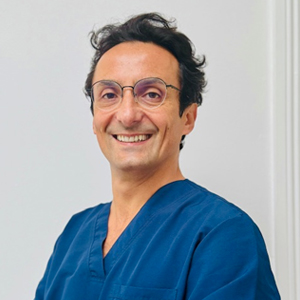
Oral surgery refers to medical procedures performed on the mouth, specifically to the teeth, jaw, and/or gums. Depending on the type of procedure being performed, it may be done by one of our general dentist or oral surgeons in our practice, or we can refer you to a specialist at a hospital.
Surgery performed in a dental practice is quite common and requires only a local anaesthetic. Many people don’t realise that simply having a tooth extracted (such as wisdom tooth removal) is a form of oral surgery. There is no need to let the term frighten you or make you feel apprehensive.
A dentist will normally refer patients to an oral surgeon for issues such as treatment of wisdom teeth, complex extractions, or if you have a complicated medical history.
A number of conditions may require oral surgery, including:

Specialist Oral Surgeon
Languages Spoken: English, Spanish, Italian 


“I’m a highly trained oral surgeon with a strong commitment to providing high-quality, pain-free treatment to all my patients.”
Queen Victoria Hospital
Associate Specialist Oral and Maxillofacial surgery
University College London
Associate Clinical Lecturer
I am a highly trained oral surgeon with a strong commitment to providing high-quality, pain-free treatment to all my patients. Having worked with a diverse range of individuals, I have developed excellent communication skills and excel at putting patients at ease and clearly explaining procedures, expected outcomes and post-treatment follow-up needs. I have extensive experience performing oral surgery and oral medicine, including difficult extractions, dental implants, restorations and bone augmentation procedures. In addition, I am adept at diagnosing and managing treatment of infective, premalignant and immunological oral diseases.
Throughout my career, I have trained and mentored numerous dental students, new dentists and other clinical and non-clinical staff. This includes lecturing and teaching university and continuing education courses in oral medicine as well as assessing progress and providing individualised support to assist students and colleagues in learning new techniques and procedures.
Wisdom teeth are the last set of teeth to develop and erupt through the gums. They are located at the very back of your mouth, and are otherwise known as third molars. When the jaw is large enough to allow room for them, the teeth emerge from the gum line and you do not experience any problems. However, most of the time this is not the case. Therefore, when your wisdom tooth fails to emerge in proper alignment or fails to full emerge through the gum line and becomes entrapped between the jawline and gum tissue, we refer to this as an “impacted” tooth.
When a tooth is trapped, it can result in unwanted swelling, pain, and infection of the surround gum tissue. Furthermore, an entrapped wisdom tooth can cause damage to nearby teeth, bums, and bone. It can sometimes also result in the formation of cysts and tumors that can destroy parts of your jaw.
Note – other teeth, such as the cuspids and the bicuspids can become impacted and can cause the same types of problems described with impacted wisdom teeth.
It is for the above named reasons that dentists will recommend oral surgery to have impacted teeth removed.
When teeth are lost, due to an accident or an infection, you can have a bridge or a denture put in place. However, another alternative are dental implants. The implants are tooth-root substitutes that are surgically anchored in place in the jawbone and stabilise artificial teeth that are attached to it. Please see this page for more information on dental implants.